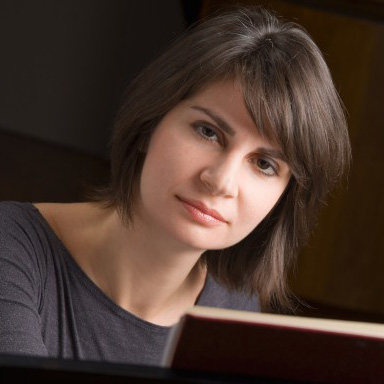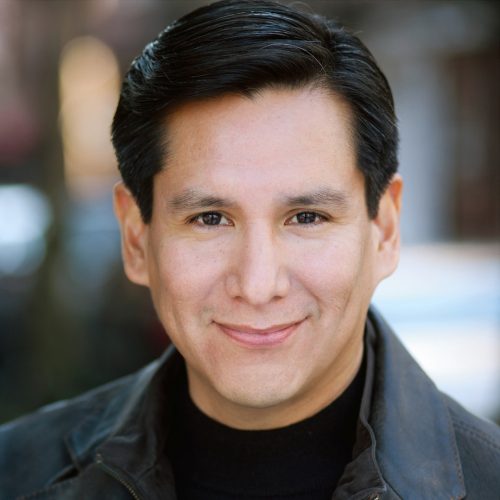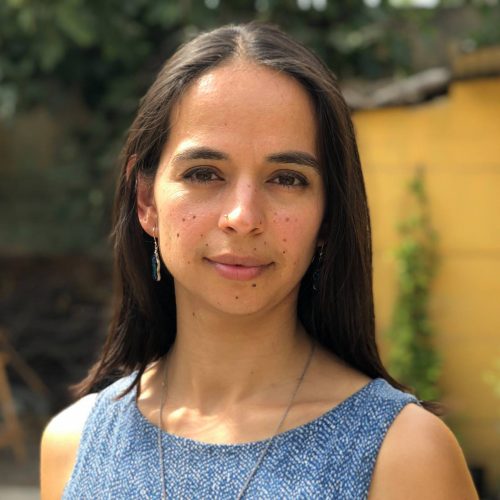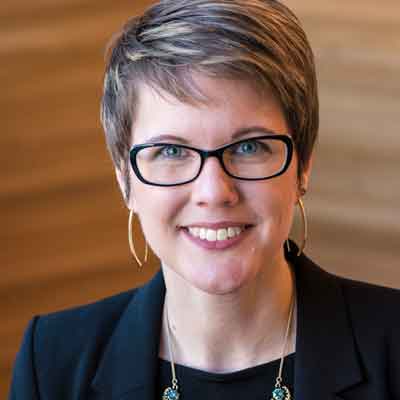By Jessica Kaufman
Five new full-time faculty members joined Eastman this semester, and we are introducing them by asking each of them three questions:
Where do you see music moving in the future, and what are the current challenges of the classical music world?
What is your top priority in educating the next generation of artists?
What upcoming project are you excited about?
We also asked each new faculty member if he or she had words of wisdom to offer this year’s incoming class.
Of course we got some fascinating answers!
For more biographical information on each faculty member, go to their individual pages at esm.rochester.edu/faculty/.
Marina Lomazov ‘93E, ‘00E (DMA)
Professor of Piano
Much has been written about the challenges facing the classical music world, with the word “challenge” carrying a negative connotation. But a challenge can become a tremendously positive force, it causes us to invent, to create new paths, to build new models. It has been happening already – musicians using social media to self-promote instead of relying on managers, presenters exploring new venues to bring concerts to audiences, performers experimenting with juxtapositions of styles in non-traditional concert formats.
The classical music canon itself, the body of work by some of the greatest minds in history, is part of our collective heritage, and it is being fed by new voices in music all the time. It will continue to adapt to a new environment, as it has done over the centuries, and will continue to remain one of the most powerful and influential sources of inspiration for future generations.
Each talent is unique and each young person needs continuous care and attention for their talent to be fully realized. I see my role at times as that of an educator, a mentor, a coach, and eventually as a friend and a colleague.
I usually have several projects in process at the same time. Being a co-director of the Southeastern Piano Festival together with my husband, Dr. Joseph Rackers, is an incredibly gratifying annual project. We seek a balance between presenting new and traditional programming side-by-side, while providing education and support to an elite group of pre-college pianists. Another just completed project with Joseph Rackers was to record duo piano works by Igor Stravinsky and we are embarking on a new project of recording newly composed works for piano duo.
Timothy Long ‘92E (MM)
Associate Professor of Opera; Music Director, Eastman Opera Theatre
In New York City, where I’ve lived for many years, classical music is moving out of the concert hall and into atypical venues that reach out to newer and more diverse audiences. It is hugely important to embrace this and to think of how we can fit into our modern cultures. The challenge is in creating careers within this expanding paradigm while maintaining the great knowledge that we receive from knowing traditions of the past.
Expanding on the above, the top priority in my teaching is to create thinking, pro-active artists. For many years, we were simply taught to obey our teachers. There is a certain safety in this, but it’s absolutely essential that we learn to look at ourselves honestly and make decisions. This comes from using both sides of the brain in score study, linguistic study, and then letting the imagination inform us toward making individual viewpoints. It goes beyond simply making music and requires us to be citizens of the world.
I’ve been lucky to have many projects that have excited me. I recently finished conducting Mozart’s Die Zauberflöte in the same theatre where Mozart conducted the premiere of Don Giovanni (which we’re performing next April at Eastman). I’ll soon be performing a world premiere with White Mountain Apache violinist/composer, Laura Ortman, and Navajo noise artist, Raven Chacon, at National Sawdust in Brooklyn and I’ll also be performing at the Kennedy Center in September with Eastman alumnus Brian Mulligan. We’ll be performing a world premiere by another Eastman alumnus, Gregory Spears, based on Walden, and then the Diary of Virginia Woolf by yet another Eastman alumnus, Dominick Argento.
Be open to many ideas and learn from as many people as you can. Your time at Eastman will pass in a heartbeat and suddenly you’ll be looking back with great fondness and nostalgia for what you had. That is where I am and I’m so lucky to be returning to this great school!
Anaar Desai-Stephens
Assistant Professor of Musicology
Given the national and global political climate – multiple refugee crises, rising authoritarianism, environmental disasters, and more – I think that the world of classical music must find ways of addressing these pressing issues. We need to come up with new venues and formats for presenting music, innovative ways of connecting with audiences, and meaningful ways to tap into the conversations that really matter to people today. It’s an exciting opportunity to re-situate classical music as part of a global cultural dialogue about the issues that matter the most today.
As a globally-minded ethnomusicologist, my priority is to create interesting musicians – individuals who can think creatively and carefully about what they are playing and programming. I want my students to be aware of the cross-cultural interactions that shape all musical sound and practice, and to be able to articulate the interconnections between the music they play and other forms of music out there in the world. And I want them to find creative ways of using music to connect with the topics and issues that they care about. This is a time in which the most exciting artists will be, I think, the ones who are always actively thinking about what it means to be a performer, the responsibilities and exciting opportunities that this role affords.
I am co-editing a collection of articles about affective experience in musical cultures across the world, what we are calling “musical feelings.” I am about to start working on an article that takes a critical lens to the idea of “talent.” I am also very excited about a series of workshops, co-organized with a number of Eastman colleagues, on creating classrooms built on inclusivity and equity. And the course on “Approaches to Musical Ethnography” that I am teaching this fall!
There is SO much great music coming through Eastman and Rochester. Take advantage of it, and listen broadly – there are amazing musicians in every genre of music and inspiration can be found in the most unlikely of spaces.
Rachel Roberts ‘03E
Associate Professor of Music Leadership; Graduate Degree Program Director, Institute for Music Leadership
The past decade has demonstrated an exponential increase in musicians creating new pathways of performance mediums, including locations, experiences, and collaborations of all forms. In roughly the same time period, our country – and the world – has experienced increasing obstacles to surmount, inclusive of economic, environmental, equity and equality challenges (among many others). I believe the future of music lies at the crux of these two seemingly disparate ideas. How can music continue to integrate into cultures, societies, and everyday lives in meaningful ways? How can music continue to grow as a recognized and integral tool for economic and cultural problem-solving? There will always be a need for highly trained musicians who can create and share music with the world around us. What comes with the title of ‘musician’, I believe, is the responsibility of being (1) an articulate advocate for the what and why we do what we do, and (2) the creative doer behind the music that takes a leadership role in our world.
My top priority is to ensure that artists stay curious. The practice of music and the practice of leadership are intertwined artforms that need to be practiced, crafted, reflected upon, and cared for each and every day. While we can teach and aspire to share all of the knowledge and insights that support the development of musicians and leaders, we can never teach it all. The world changes every day, just as policies change, economies change, and our own individual lives change. Amid this continuing change, the one constant is the mindset that each artist carries with them daily. How can we create leaders who continually embody a reflective, critical mindset to their craft? How can we create leaders who have the mindset of self-efficacy, and surround themselves with opportunities to continue learning, growing, and developing? I aspire to help inculcate a generation of leaders in music that will go out to lead in the music world, now and into the future, regardless of the changes that will inevitably evolve along the way.
Now, more than ever, the world needs excellent musicians who are passionate advocates and skilled leaders. Stay curious. Don’t shy away from the hard questions. Protect and cherish the time you have in school, and engage as fully as possible. Above all, remember that the Eastman community is enormous and incredibly supportive. You’ll never be traveling this journey alone, and don’t ever hesitate to connect!
Guy Johnston ‘12E
Associate Professor of Cello
I think one of the main challenges is to keep music alive and active in schools. I’m curious to know how the system works in the States, because in the UK we are constantly battling with the government wishing for more focus on music in schools. We have to work hard to be sure every child has access to music. It’s one of the most fulfilling aspects of my music festival at Hatfield House seeing children at our education concert, who might not have been to a classical concert before, responding to what they are seeing and hearing. Every child should be given the chance to be a musician. It’s such a positive influence in so many ways not least learning to listen to each other, being creative, developing a new skill and making many new friends through the process. Music builds communities.
My top priority is to give the next generation their best chance in preparation for the profession, sharing all the knowledge and experience I’m continuing to build on and being as supportive as I possibly can be through the process. It is not easy to make a living as a musician, and the desire has to be burning inside to keep us all going and to fulfill our dreams.
This summer, I was at the Australian Chamber Music Festival and had a wonderful time in Townsville. I’m very excited to begin my new post at Eastman ahead and getting to know all the students and faculty. I’ll be balancing the year with teaching and performing with concerts in the UK and Germany as well as releasing a few CDs. Variety is the spice of life, and I’m thrilled to be joining the Eastman community.
Jessica Kaufman is Eastman’s Assistant Director of Public Relations.




